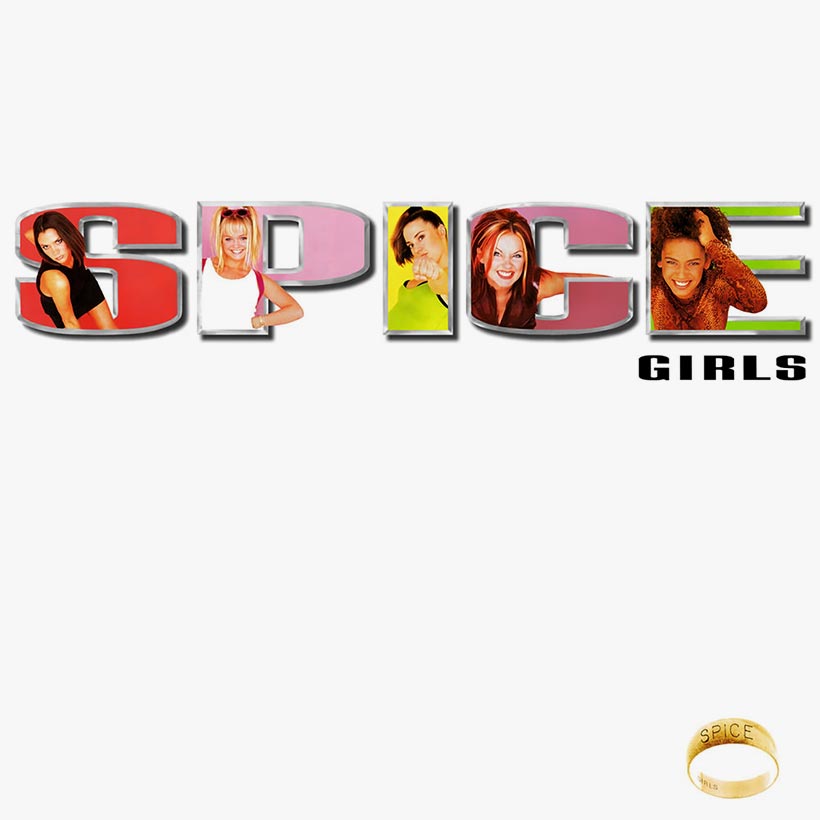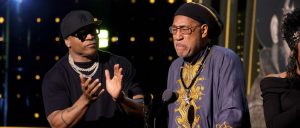Sometimes a band just completely owns a moment. In the autumn of 1996, that band was Spice Girls. As “Spicemania” tightened its grip on the UK, so it soon also spread like wildfire across the globe. Grunge, R&B, and dance music had dominated the first half of the decade, but this feisty five-piece reinvented pop in the most dramatic way imaginable.
Listen to Spice on Apple Music and Spotify.
It’s unlikely the shrewdest record-label strategist would have predicted Spice Girls’ phenomenal success. Girl groups weren’t big business anymore. 80s chart champions Bananarama’s hits had largely dried up by 1994, and the more recent Eternal had struggled to break through internationally, despite a solid domestic profile.
Spice Girls, however, shattered that glass ceiling. The winning chemistry of Melanie Brown, Emma Bunton, Geri Halliwell, Melanie Chisholm, and Victoria Beckham – first blended together at open auditions – was infectious and far more natural than the backstory would suggest. When that first early management arrangement wasn’t moving fast enough for them, the group broke away from the budding pop svenaglis that had brought them together and secured their own future by sourcing independent deals with more experienced songwriting teams and, in time, publishing and label executives. This was a pop act with the charisma, confidence, and determined swagger of the rockers.
Energetic and hugely infectious
Spice, the first of only three albums by the quintet, was a sure-fire hit upon its UK release, on November 4, 1996, following two big No. 1 singles: “Wannabe” and “Say You’ll Be There.” The former is an attitude-filled power-pop anthem, recorded at breakneck speed, launching the group and topping the charts in more than 20 countries, including the US. Its nonsensical call-to-arms was energetic and hugely infectious, and remains the band’s most recognizable moment.
“Say You’ll Be There” was less frenetic: an R&B swinger that showcased the strong harmonies that characterized the group’s sound. It immediately demonstrated that Spice Girls were no novelty act. Third single – and their first ballad – “Two Become One” deepened the sound and was the first of the group’s three consecutive Christmas No. 1s in the UK – the industry’s most important sales snapshot of the year.
It’s fair to concede that Spice Girls were essentially an extremely proficient singles act. You’ll likely remember all of those great early hits. The saccharine “Mama” and disco-Europop fusion “Who Do You Think You Are” got parceled together as a double bill to – predictably – more chart-topping favor, in March 1997, but there are five other cuts that complete Spice.
Those songs, recorded with pop production team Absolute, ranged from the slinky shuffler “Something Kinda Funny” to the fragile ballad “Naked.” Perhaps only “If U Can’t Dance” – featuring a rap in English from Mel B, and Geri doing the honors in Spanish – and the pacey “Love Thing” truly captured the spirit of the singles. On a song like “Last Time Lover,” meanwhile, the R&B swingbeat – so dominant throughout the 90s – threatens to drown an interesting melody in a mid-Atlantic production treatment that somewhat dates this and the other album cuts. But perhaps those glorious singles – still on endless playlist rotation – so dominate our memories of Spice that everything else inevitably pales a little in comparison.
“Anyone can be a Spice Girl”
Absolute’s Andy Watkins and Paul Wilson were joined by Eliot Kennedy, Richard Stannard, Matt Rowe, and Cary Baylis on writing duties (with Stannard and Rowe featured on the most memorable “Wannabe” and “Two Become One”), but it’s important to note that the band shared credits on all of Spice’s tracks. This was no token business arrangement; Geri and Mel B were most consistently referenced as strongly shaping the compositions, but each member played their part. If Spice Girls wasn’t entirely a partnership of equals, everyone involved understood where they fit.
“Anyone can be a Spice Girl,” Emma Bunton announced in a TV ad to launch the record, and it was true that the five’s colorful image was almost as important in breaking the band as the music. The cartoon-like monikers adopted by each woman fast-tracked people’s interest. Emma’s “Baby”, Victoria’s “Posh”, Mel B’s “Scary”, Mel C’s “Sporty” and Geri’s “Ginger” were simply too succinct and successful to have been dreamed up in some marketing brainstorm. The throwaway captioning by a teen magazine just seemed to stick and was adopted by the band so successfully that the five soon rivaled the impact of the previous decade’s pop titans Michael Jackson and Madonna. No band since The Beatles had enjoyed such hysterical success on a worldwide scale.
But none of that focus on image detracts from the five fabulous pop singles and five largely successful album tracks that powered Spice to unprecedented success. Topping the UK charts for 15 non-consecutive weeks, becoming Europe and North America’s biggest album in 1997, and shifting a staggering 23 million copies worldwide to date, Spice is one of the most successful records of all time. It seemed so simple, but other acts’ subsequent attempts at the formula have largely fallen short.
Perhaps with a harder production edge and less charismatic players, Spice would have been a little-remembered light R&B project, but this dance/pop juggernaut – lasting a modest 40 minutes – can hardly do justice to the energy of that time. Coming just before the digital revolution (Spice Girls were one of the final acts to make their fortune largely from CD sales) the seeds of today’s #MeToo movement can be heard in the band’s simple call-to-action: “Girl Power.” How many of today’s marchers were schooled in that accessible, empowering message?
Revolutions aren’t always built on controversy. With infectious attitude, bags of drive, and a handful of classic singles, Spice Girls dominated pop culture in little over six months. Perhaps there’s a lesson for other game-changers: cut back the cynicism and unleash the charisma. This really was pop at its most politically potent.




